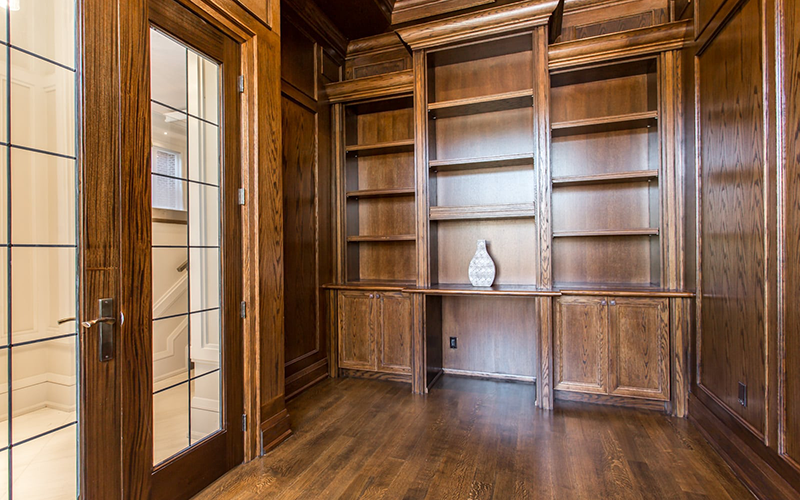Interior doors may seem like a small detail in your home’s overall design, but they can actually make a significant impact on your space’s aesthetic. The right door can add character and charm, create a focal point, and even influence the overall mood of a room. Here are some tips on how to make a design statement with interior doors.
Always Keep the Door Purpose in Mind
The first step in choosing a door design that makes a statement is to consider the door’s purpose. For example, if the door is meant to separate a living room from a dining room, you may want a design that complements the style of both rooms. If the door leads to a bedroom, you may choose a door that creates a sense of privacy and relaxation. Always remember how the door will be used and what effect you want it to have on the room.
How Formal is Your Space?
The formality of your space is another crucial factor to consider when choosing a door design. For instance, a formal dining room may benefit from a grand, oversized door with intricate details and finishes. On the other hand, a casual den or home office may look better with a simple, modern door design. Consider the overall formality of your space and choose a door that fits that style.
Assessing Architectural Style
The architectural style of your home is another important consideration. You want your door design to complement the overall style of your home, whether it’s modern, traditional, or somewhere in between. If you have a mid-century modern home, for example, you may want to choose a door with clean lines and minimal embellishment. If your home is a Victorian-style mansion, you may opt for a more ornate and detailed door design.
How to Choose Door Hardware
When choosing door hardware, there are a few key factors to consider:
Style: The hardware should complement the overall style of your home and the door itself. For example, a sleek, modern door may look best with contemporary hardware, while a traditional one may require more ornate hardware.
Finish: The finish of the hardware should match or complement other finishes in the room, such as light fixtures, cabinet handles, and faucets.
Function: Consider the purpose of the door and the level of security and privacy required. For example, a bedroom door may require a locking mechanism, while a closet door may only require a simple knob.
Durability: Choose hardware that is durable and can withstand frequent use.
Why Hardware Matching is Important
Matching the hardware throughout your home is important for creating a cohesive look and maintaining consistency. It can also increase the resale value of your home by enhancing its overall aesthetic appeal. Mismatched hardware can be distracting and create a disjointed appearance.
Use Doors to Control Noise Within Your House
Solid-core doors: Solid-core doors are better at blocking noise than hollow-core doors. They are also more durable and can last longer.
Weatherstripping: Adding weatherstripping around the perimeter of the door can help to seal any gaps and prevent noise from entering or escaping.
Soundproofing materials: For maximum noise control, you can add soundproofing materials to the door itself or the surrounding walls.
Door sweeps: Installing door sweeps at the bottom of the door can help to reduce noise by blocking gaps between the door and the floor.
By choosing the right hardware and utilizing doors as a tool for noise control, you can create a more peaceful and stylish living environment.
Using Interior Doors to Regulate Airflow
Interior doors can be used to regulate airflow and improve the overall comfort of your home.
Choose a door with a vent: Some doors have built-in vents that allow air to flow through the room even when the door is closed.
Add a transom window: Installing a transom window above the door can help to improve airflow and allow natural light to flow through the room.
Use a louvered door: Louvered doors feature slats that allow air to pass through while still providing privacy and sound insulation.
Factors That Influence Quality
When it comes to interior doors, quality is important for both aesthetic and functional reasons. Here are some factors that can influence the quality of an interior door:
Weight: A heavier door is generally considered higher quality, indicating a more substantial construction and better sound insulation.
Construction: Doors with solid-core construction are generally considered higher quality than hollow-core doors. The type of wood used for the door can also impact its quality.
Thickness: Thicker doors are generally considered higher quality, as they provide better sound insulation and are more durable.
The Taller the Ceiling, The Taller the Door
When it comes to choosing the height of your interior doors, it’s essential to consider the height of your ceilings. Generally, the taller the ceiling, the taller the door should be. This helps to create a more balanced and visually appealing space. If your ceilings are particularly high, you may want to consider custom-made doors to ensure that they fit properly and complement the overall design of the space.
What is the Outer Casing?
The outer casing is the frame that surrounds the interior door and provides a finished look. It covers the rough opening in the wall and helps to keep the door in place. The outer casing can be made from a variety of materials, including wood, PVC, and MDF.
How to Choose the Right Outer Casing
When choosing an outer casing for your interior doors, consider the following factors:
Style: The outer casing should match the style of the interior door and the overall design of the space.
Material: Choose a material that is durable and will stand up to regular use. Wood is a popular choice for its natural beauty and longevity, but PVC and MDF can be more affordable and require less maintenance.
Color: Consider the color of the outer casing in relation to the color of the walls and other elements in the room. A contrasting color can create visual interest, while a matching color can create a seamless look.
Size: The size of the outer casing should match the size of the door and the opening in the wall. It should also be proportionate to the size of the room.
When to Use Pocket Doors
Pocket doors are a great option for small spaces where a swinging door would take up too much room. They slide into a pocket in the wall when open, allowing for maximum use of the available space. Here are some situations where pocket doors may be a good choice:
Small bathrooms: Pocket doors can be a great solution for small bathrooms where a swinging door would take up too much space.
Closets: Pocket doors can be used to maximize storage space in closets, without sacrificing floor space.
Open-concept living: In open-concept living spaces, pocket doors can be used to create separate areas for privacy or to control noise levels.
Accessibility: Pocket doors can be a good choice for individuals with limited mobility, as they require less clearance than swinging doors.
When to Use Other Types of Doors
In addition to standard interior doors, several other types of doors can be used in specific situations. Here are some examples:
French Doors
French doors are a classic choice for interior spaces and are often used to separate rooms while still allowing light to flow through. They consist of two doors that are hinged on opposite sides and meet in the middle when closed. French doors are a good choice in the following situations:
As a divider between two rooms: French doors can be used to separate two rooms while still allowing them to feel connected.
As a focal point: French doors can add visual interest and elegance to a space.
To allow natural light to flow through: The glass panels on French doors allow natural light to flow through while still providing privacy.
Glass Doors
Glass doors are a modern and stylish option for interior spaces. They can be made from clear or frosted glass and can be used in the following situations:
To create a sense of openness: Glass doors can make a space feel larger and more open.
To allow natural light to flow through: Glass doors allow natural light to flow through while still providing privacy.
To showcase a view: Glass doors can be used to showcase a view or highlight an interesting feature in the room.
Sliding Doors
Sliding doors are similar to pocket doors in that they slide into the wall, but they do not require a pocket frame. They are a good choice in the following situations:
To save space: Sliding doors take up less space than swinging doors, making them a good choice for small rooms or closets.
To create a sense of openness: Sliding doors can make a space feel larger and more open.
To create a unique design feature: Sliding doors can be customized with a variety of materials, including wood, glass, and metal, to create a unique design feature in the room.
Why It’s Important to Work With a Professional Custom Door Company
When it comes to designing and installing custom interior doors, it’s important to work with a professional custom door company. Here are some reasons why:
Expertise: A professional custom door company has the expertise and experience to design and install custom doors that meet your specific needs and preferences. They can guide you through the design process and help you choose the best materials, finishes, and hardware for your project.
Quality: A professional custom door company uses high-quality materials and construction techniques to ensure that your doors are durable, functional, and beautiful. They can also provide warranties and guarantees to ensure that you are satisfied with the finished product.
Customization: A professional custom door company can create doors that are tailored to your exact specifications, including size, shape, style, and finish. This means that you can create doors that are truly unique and complement your interior design style.
Efficiency: A professional custom door company can complete your project efficiently and effectively, minimizing disruptions to your daily routine. They can also coordinate with other contractors and tradespeople to ensure that your project is completed on time and within budget.
Get Started Designing Your Custom Interior Doors with Master Doors
If you’re ready to create custom interior doors that enhance the beauty and functionality of your space, consider working with Master Doors. Here’s how to get started:
Consultation: Contact Master Doors to schedule a consultation with our team of experts. We will discuss your project goals, design preferences, and budget to create a customized plan for your project.
Design: Master Doors will create detailed drawings and renderings of your custom doors, so you can visualize the finished product before it’s installed. We will also help you choose the best materials, finishes, and hardware for your project.
Production: Once the design is finalized, Master Doors will begin production on your custom doors. We use the highest quality materials and construction techniques to ensure that your doors are durable, functional, and beautiful.
Installation: Master Doors will coordinate with other contractors and tradespeople to ensure that your doors are installed efficiently and effectively. We will also provide any necessary finishing touches to ensure that your doors are fully functional and meet your satisfaction.
With Master Doors, you can create custom interior doors that are truly unique and complement your interior design style. Contact us today to get a quote and get started on your project.



